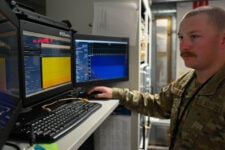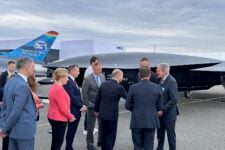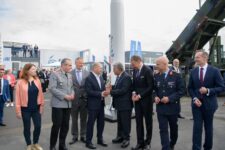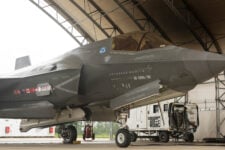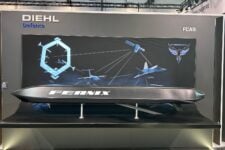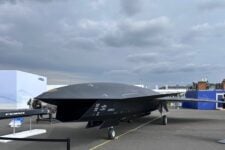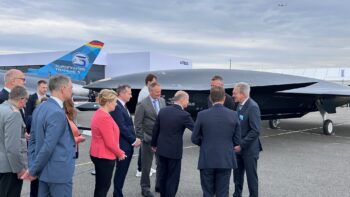
A sign for Anduril at the AFA 2022 Air, Space and Cyber Conference. (Justin Katz/Breaking Defense)
WASHINGTON — In June, defense firm Anduril announced its purchase of small solid rocket motor firm Adranos. It was a move that seemed out of character for Anduril, which has based its product lines around artificial intelligence and automation — the kind of high technology that the decidedly low-tech solid rocket motor doesn’t need.
But in a recent interview with Breaking Defense, Anduril founder Palmer Luckey said the purchase is only the first step for the firm’s rocket and missile ambitions — a big bet for the relatively small company that more efficient tech can take on the industry behemoths, as Anduril works towards the goal of becoming a prime defense contractor.
“We’re going after everything that’s on the [Defense Department’s] list. All the way from Javelin-class all the way up to intermediate range missiles,” Luckey said, adding that the company believes enough in the potential market that it had been considering the acquisition for “at least two years.”
While acknowledging solid rocket motors are lower tech than what the company usually is involved in — “they’re candles, you light them on fire and they go” — Luckey argued that Anduril can bring its software and automation background into the manufacturing process.
On the software side, “there actually is a lot of things that you can do to make motor manufacturing more robust: increase automated quality control, increase automated manufacturing, reduce the man power that’s involved in making these things,” he said. “When it comes to large scale batching, quality controlling, extruding, cutting packaging, scanning and x-raying of these fuel grains, there’s a lot of room to automate.”
Improving the automation at the quality control level, he argued, means that the manpower-intensive process of making sure a solid rocket motor is safe from an inadvertent explosion should go down significantly. That then allows for larger batches to be produced at once, which is where the manufacturing background of a number of Anduril employees could come into play.
“I don’t even think you need to be a rocket motor engineer to do a lot of this, you just need to have people who are used to making things at a scale of, let’s say, millions of Oculus Rifts a year,” he said, referencing the virtual reality headset created by his first company. “And then you’d have to say, ‘How do I bring that same approach here where I need to be making millions of something, and it’s a pretty advanced thing to make, but I need to make millions of it for as little money as possible?’”
The company is investing in new facilities that should allow them to scale from the “hundreds” per year Adranos was producing to “thousands” per year, according to a company spokesperson. (Anduril declined to provide a dollar figure on what the internal investments would be.)
Notably, Luckey revealed that Anduril “looked at whether it made sense to try and buy” Aerojet Rocketdyne before the latter was absorbed by L3Harris. “The thought crossed our mind as we watched all of these antitrust concerns play out with the larger primes,” he said, referencing the long-running questions about whether the federal government would ok the sale of Aerojet to L3.
Asked whether having the two largest rocket motor suppliers part of bigger companies — Aerojet now as part of L3 and Orbital ATK now part of Northrop Grumman — means being a new entrant in this space will be challenge, Luckey expressed confidence.
“Even the companies that own these providers, they have not like fully vertically integrated, they’re still buying things from other providers,” he said. And, he emphasized, Anduril’s manufacturing plans, combined with a metallized alloy Adranos developed which claims a 40 percent range increase, means the business case should sort itself out.
Byron Callan, an analyst with Capital Alpha Partners, estimates the overall military solid rocket motors market is around $1.5 billion annually. Whether there is enough demand for three major suppliers isn’t clear; A 2017 Government Accountability Office report found that there was not enough demand from the Pentagon for more than two suppliers of solid rocket motors “economically viable,” although that was before demand for munitions spiked as a result of the Ukraine war.
“It’s cheaper. It has better quality control through our automated manufacturing, and your performance is going to go up,” Luckey said of his pitch for Anduril’s new offering. And in terms of getting decision makers, both in industry and the Pentagon, to buy in, “You could fit every guy who makes these types of decisions in my office. So, we just have to convince them. And I think if we actually put our own money into doing it, they will be very convinced.”
Anduril’s Corporate Strategy
The addition of a solid rocket motor arm is part of Luckey’s long-term plan to turn Anduril into an overall defense prime. To reach that status, he said, requires being a regular competitor across market sectors.
“The only way that we’re going to get to the scale of a prime that can change the way a lot of things are done is to work across the same domains that a prime has to do,” he said. “You have to fight and win across multiple areas.”
That includes plans for land, air, sea, underwater and space systems, with Luckey expressing confidence that there would be some announcements about land capabilities in the near future. (He also expressed frustration with the fact he is regularly unable to hype up some of their projects due to the government telling the company not to advertise capabilities. “I wish that we could talk about them, if only for recruiting purposes,” he said. “It’s driving me crazy.”)
On space, the company has largely focused on software so far, but Luckey said the goal is to get into physical systems eventually. “We have not done anything really serious on the space hardware side. I would like to, there are things we can do that I’m very excited about. But it’s just that we haven’t found the obvious wins.”
However, Luckey ruled out a major play into the cyber realm, saying “there’s just so many competent companies that it doesn’t make sense for Anduril to play in cyberspace … we get a lot of people who would like us to be doing stuff there. There’s just so many good competent companies, I don’t want to be spending my investor money trying to kill other companies who are doing a great job, even if I think we could do well.”
Asked whether the company is growing too quickly in too many ways, Luckey said that is an understandable concern but noted that as it is expanding, the firm is bringing in new talent with experience in these areas. Moving into space systems wouldn’t result in existing Anduril engineers taking on space, for instance, but rather the company going out and recruiting heavily from existing companies to poach that knowledge and experience.
And ultimately, he said, company leadership is focused on the core strategy of not chasing things that have no market.
“Anduril is only going to work on things that we think we can do well, that other companies are doing poorly, that the Pentagon cares about, and Congress is willing to fund — because of the Pentagon doesn’t care about it, it’s not a priority, we shouldn’t be working on it,” he said. “If Congress isn’t willing to fund it, there’s not going to be any way to actually get it done and scaled and solved, so it’s not something I can afford to work on.”
Department of the Air Force announces new generative AI program: NIPRGPT
NIPRGPT will help airmen and guardians with correspondence, research and coding tasks all while being connected to a secure online environment, according to an announcement.




